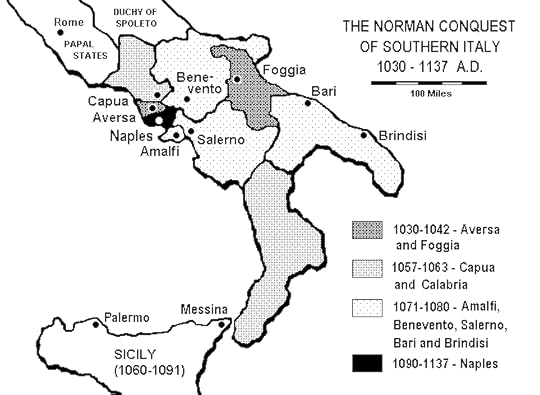What You Never Learned About in School: The Norman Conquest of Sicily
The Normans Conquer Sicily
History Time (2020)
Film Review
The Norman conquest of Sicily is yet another key historical event you never learn about in school.
Prized for its lush agriculture, Sicily was ruled by the Byzantine Empire prior to its conquest by Arab Muslims in the 9th century AD. The island’s new Muslim rulers moved the island’s capitol from Syracuse to Palermo and continued the island’s valuable trade in papyrus, citrus, dates and sugar. They allowed their Greek subjects (in pre-Roman times Sicily was home to many major Greek colonies – see The Greek Colonies You Never Learned About in School) to practice their orthodox religion, so long as they paid the tax charged non-Muslims.
In 1038, the Byzantine Empire made an unsuccessful expedition to retake Sicily with the support of Greek, Bulgar troops, along with Norman mercenaries from the Duchy of Normandy (established by Viking raiders in northern France in the 9th century).
In 1061, the Pope encouraged the Norman prince Roger Giscard* to initiate a campaign of his own in Sicily. His forces captured Sicily’s eastern port of Messina, but its Greek Christians rebelled, enabling Muslim troops to defeat Norman forces at night when they were drunk. The Norman’s ultimate conquest of Sicily required many battles between Norman invaders and Ibn al Havas, Sicily’s Muslim ruler.
As Roger and his brother Robert systematically expanded expelled Byzantine forces from southern Italy, they simultaneously expanded Norman control westward from the east coast of Sicily. In 1091, they defeated the last remaining Arab defenders in Palermo.
Just as the Norman conquest introduced feudalism to England, the Norman conquerors took control of Sicily’s agricultural land, and its former Greek and Muslim owners became their serfs. However Roger proved far better administrator than William the Great (aka William the Conqueror), the Norman prince who conquered England in 1066. Roger achieved better centralized control by giving local Norman nobility far more power that William gave his noble.
Under Norman rule, Sicilian Greeks, Berbers and Arabs were allowed to openly practice their religion provided they pledged allegiance to Roger and his descendants. A new influx of Lombard settlers around 1100 would make Catholicism Sicily’s dominant religion.
Owing to its strong trade ties with the Fatamid Empire in North Africa, Sicily remained neutral during the First Crusade (1096-99).
Roger’s son, Robert Borsa, merged Sicily and all the Norman lands in southern Italy into a single kingdom known as the Kingdom of Sicily. It remained under Norman control until Napoleon invaded Italy in 1796.
*Following the fall of Rome, the Byzantine Empire assumed control of southern Italy. After the Normans consolidated control of the Duchy of Normandy, the Norman prince Roger Giscard and his brother set about the conquest of Lombardy and the rest of southern Italy.

The Most Revolutionary Act
- Stuart Jeanne Bramhall's profile
- 11 followers



